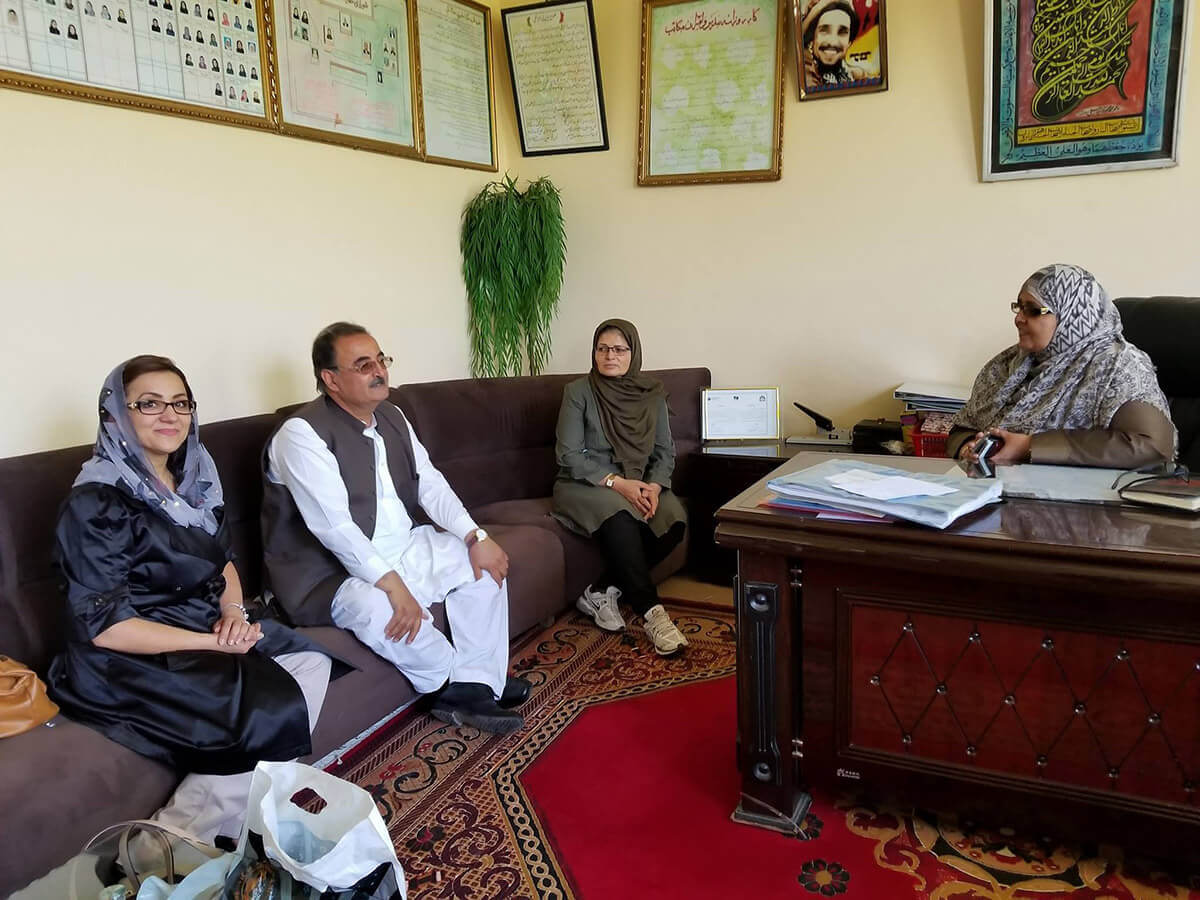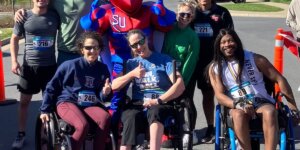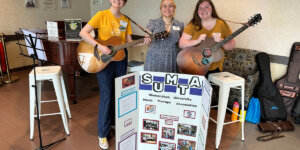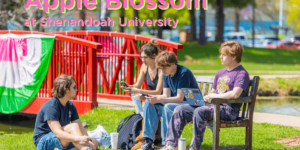On May 31, a tanker-truck bombing in Kabul, Afghanistan, killed more than 150 people, in the worst suicide bombing since the Taliban’s 2001 ouster.
Nazila Raofi Salamkhail ’17, Pharm.D., who had graduated from Shenandoah University’s Bernard J. Dunn School of Pharmacy earlier that same month with a doctor of pharmacy degree, was in the city.
“On Wednesday, May 31 2017, after the Kabul explosion tragedy, I visited the Emergency Hospital and Wazir Akbar Khan Hospital (WAKH), both located nearby where the incident happened. Being present at the scene and helping the injured and their families gave me a little comfort as a person, and as a healthcare professional, to be able to help when and where needed the most,” said Salamkhail, who was on a two-week-long humanitarian trip to serve her home country.
“I returned to Afghanistan after more than 20 years. I wanted to work as an intermediary and serve as a bridge between the healthcare professionals in the United States and our counterparts in Afghanistan. I wanted to introduce the healthcare professionals in Afghanistan to the new technologies and evidence-based treatments used by the healthcare professionals in the U.S, and at the same time, look into possible new disease states prevalent in a third world setting which could open new venues of research and understanding of our colleagues, enriching the field of research in the U.S.,” Salamkhail said.
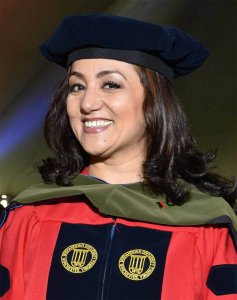 “I think, we find very few like Nazila, who have the commitment and desire to do good, and the conviction to follow it through,” said Shenandoah Assistant Professor of Pharmacy Ranjani Varadarajan, Ph.D. “That’s what makes her special.”
“I think, we find very few like Nazila, who have the commitment and desire to do good, and the conviction to follow it through,” said Shenandoah Assistant Professor of Pharmacy Ranjani Varadarajan, Ph.D. “That’s what makes her special.”
Salamkhail’s path to the United States wasn’t a direct one. She was a medical student in Afghanistan, but, as a woman living under the Taliban regime, gaining an education or even getting out of the house was challenging, and as a result, she moved to Pakistan in 1996, where she continued her medical studies at a university for immigrants. However, that university closed in 1998. She then moved to the United States in 2001.
Sadly, a family tragedy, which occurred during the turbulent times prior to her move to the U.S., prompted her to consider studying pharmacy. “Finding all doors closed in my face, and an unknown future on the horizon, forced me to look into any available self-betterment opportunities in Pakistan. I started to invest more time and effort in learning English. Meanwhile, I was searching into the different ways of getting out of Pakistan; I dreamed for an education opportunity in the West, especially in the U.S. The untimely death of my young cousin due to a medical error was a tragic loss which triggered my interest and drew me to the profession. Back home, individuals with very limited knowledge of disease or medication work at retail pharmacies; anyone with a minimal knowledge or just a familiarity with the names of certain drugs can sell medications to the public. Antibiotics are sold readily without prescription. The unfortunate death of my little cousin motivated me to start pursuing an education in pharmacy.”
She chose to study at Shenandoah’s campus in Northern Virginia (the campus was in Ashburn; the pharmacy program in Northern Virginia is now located at the Inova Center for Personalized Health in Fairfax) because the program suited both her personality and cause.
“During my interview, I had a positive feeling about the school and the educational environment that the school offered,” she said. “I felt so much care and support from the interviewing panel, especially Dr. Munson. My goal for gaining an education in the field of pharmacy has always been to be able to serve people wherever needed the most, regardless of what part of the world or to what nation or religion one might belong to; I was very glad to find Dr. Munson interested in and supportive of my cause. She encouraged me strongly and highlighted the programs and opportunities abroad for students and faculty who are willing to go overseas and provide medical assistance for people in need.”
Although she found the right fit for school, that didn’t mean the process of getting her education was a simple one. “It was not an easy job to find the balance being a wife, a mom, and a pharmacy student at the same time,” Salamkhail said. “It involved lots of sacrifices and hardships. The hardest part for me was when I had a sick child and an exam at the same time. But, I always kept my goals in perspective, and I also looked at any oncoming challenges from a different angle; I treated them as opportunities to teach and transmit something positive to my children. In a way, I taught them the importance of education in one’s life. They know that they cannot and should not stop getting an education, it is a nonstop process – in fact it is a crucial part of life and living.” Salamkhail also said her husband was essential to her success. “I would not have been able to do it without his help and support. He has always been there for me and has helped me to an extent that cannot fit any words.”
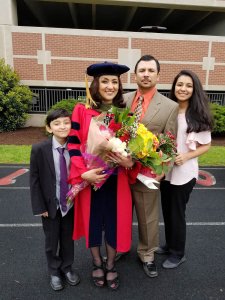
Nazila Raofi Salamkhail ’17 with her family at her graduation from Shenandoah University’s Bernard J. Dunn School of Pharmacy.
While Salamkhail is willing to see her pharmacy career progress in a wide variety of directions, she knows that she will always work on behalf of her native country and people in need around the world; her dedication to doing both is what took her to Afghanistan for the first time in two decades.
Aside from helping during the bombing’s aftermath, she also discussed the prospect of book donation to a public nursing school in Afghanistan, facilitated by Afghan Medical Professionals Association of America (AMPAA), of which she is a member. “This organization has been working to help patients in the United States as well as inside Afghanistan. My role as a member enables me to act as a bridge between healthcare professionals in both countries. I actively look for volunteering opportunities to work collaboratively with the healthcare professionals in Afghanistan. As a member, I will take an active part in AMPAA’s mission of establishing the means of telemedicine technology, a great phenomenon that could bring healthcare teams in both countries closer in real time, so they can work and discuss patient cases, surgeries and other issues. I am also a member of the American Pharmacists Association (APhA), hoping to initiate a student exchange program between Shenandoah School of pharmacy and the school of pharmacy in Afghanistan.”
During her visit, she introduced several doctors to the director of AMPAA through email. Additionally, she said that she had a second visit of WAKH during which she met with the hospital’s director, Mr. Ayubi, and toured the hospital with the help of Mr. Abdul Basir, the pharmacy manager, and saw the hospital’s challenges, firsthand. “The pharmacy was almost out of injectable and oral medications. The pharmacy staff had very few medications on hand, while having some unknown cartons of medications donated by World Health Organization (WHO). They were waiting for a delegation from the Ministry of Public Health to open the donated cartons and figure out if there were any medications they could use for their patients.”
Additionally, she brought her own brand of assistance with her. “Prior to my trip to Kabul, I started a fundraising program called ‘Make Someone’s Day.’ This project was a product of my lifelong aspiration of bringing a simple smile to a hard-working person’s face in a time of despair. I told all my family and friends that the best thing they could do for me, as a graduation gift, was to contribute to my project. I am thankful for the great support I received from my family and friends. Their gifts of donations went to some individuals/ families affected by the explosion, some patients admitted to WAKH from far provinces who did not have a home/ family in town, some street vendors who were also schoolchildren, two female students of Mora University who came from an orphanage, and some families living in villages who sent their little girls to schools. This experience also reinforced my belief that together we can make a difference, and if each one of us takes one positive step, undoubtedly, we will go far ahead.” Salamkhail also went to the high school she graduated from in Kabul, Afghanistan, to help students who cannot afford to buy school supplies, supporting them with funds raised through the “Make Someone’s Day” project.
Salamkhail “always spoke about her desire to go back and help her people back home, empower women to study, and more,” Dr. Varadarajan said. “So, I am very proud of her for staying true to her words and taking every opportunity to help. Even during her stint in Afghanistan, she could have easily returned back to her family in the U.S., but she decided to stay and put her pharmacy education and skills to use. That’s what is so unique about her.”
Although Salamkhail’s life has been touched by oppression, war and tragedy, her message for herself and others is cheerful and bright.
“Think positive, keep learning, set a goal and go for it!” she said. “You will be surprised to find out what you are capable of doing. The happiness of becoming selfless and trying to do something for humanity is a great feeling. Always try to get the best version of yourself.”
Featured photo above: Nazila Raofi Salamkhail ’17 visits her high school in Afghanistan in 2017 after graduating from Shenandoah University’s Bernard J. Dunn School of Pharmacy.
